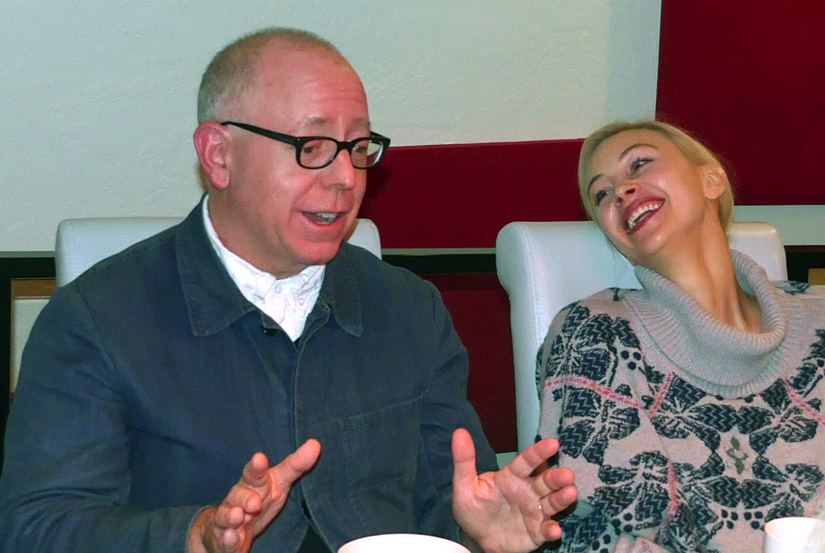
- Festivals
From Studio Head To Indie Director: A Conversation With James Schamus
He co-wrote movies such as The Ice Storm and Crouching Tiger, Hidden Dragon, produced Brokeback Mountain, founded and ran Focus Features (2002-2013), where he oversaw the production and distribution of Lost in Translation, Milk, Eternal Sunshine of the Spotless Mind and The Kids Are All Right, but this year, at the age of 57, James Schamus arrived at Sundance Film Festival with his directorial debut Indignation, which he adapted from Philip Roth’s novel of the same name.
“I never really had any particular envy or urge over the years to direct,” he explained at an HFPA-hosted dinner in Park City. “It was just finding myself happily unemployed and some of the directors that I thought might be interested in making the film were busy and my youngest daughter was going off to college, so suddenly there was this moment of, I bet this might be fun.”
Set in the early 50s, Indignation tells the story of a neurotic Jewish teenager, Marcus (Logan Lerman), the son of a Kosher butcher from Newark New Jersey, who enrolls in an Ohio college to avoid enlisting in the Korean war and falls in love there with an enigmatic girl, Olivia Hutton (Sarah Gadon), who shares his liberal thinking and gives him his first orgasm.
In spite of his intellectual brilliance, Marcus is socially inept, who can’t bond with anyone around him, refusing to conform to societal rules or religious doctrines, insisting on defining himself as an atheist. The more people around him, like his parents, the Jewish fraternity members and the Dean of his school, tell him how to behave and how to conduct his affairs, the more reclusive and indignant he becomes.
“To be indignant means that somehow your dignity has been taken away,” explains Schamus. “And I think there’s a sense that I think both these kids feel in the film is an America that is just shifting into xenophobia, McCarthyism, another useless foreign imperial war, which is just churning out death after death after death and nobody really cares, and these kids pick up on it and they get it that there’s something wrong going on and there is this incredibly repressive sexual culture that’s just starting to really gain shape in the 50s and that is just putting the thumb on women, and that all that stuff is something that he’s smart enough to know and feel, but he had never had the opportunity to articulate.”
Marcus gets the chance to articulate his indignation against the world in a 15-minutes heated argument with Dean Cogwell, who tries vainly to shake sense into him. For Marcus however, the Dean represents the conservative right wing that he abhors and resents; yet he is actually the one who comes across as the uncompromising fanatic. “He’s like a puritan, and he can’t survive in this world, where everyone is making deals and halfway compromises,” says Schamus, who was also fathered by a Kosher grocer, but insists that he has little in common with Marcus, having grown of age in the 70s in LA. “Our parents were more teenage colleagues, shall we say, at that moment in time. So it’s a very different upbringing,” he adds.
The story is actually based on Roth’s own experience at college, but it does have a universal feel to it, for many youngsters endure this sense of alienation as they try to figure out their place in this complex existence. Some survive and pave a safe path ahead, while others, like Marcus and Hutton, succumb to their angsts and seek a way to end their life journey.
“This is one of Roth’s later books, and there were things that hit me,” Schamus reflects. “One was: he’s going back in his last books, to a much more fable style of writing, which really disarmed me and really cuts through, and the other thing was the characters and his going back to a time in Roth’s life when he wasn’t Roth yet, more innocent. And I think there is a generosity towards the ancillary characters around Roth, who become central characters and they are all very real to me.”
However, given the dark subject matter and the lengthy dialogue scenes, it was not easy mounting such a project, even for someone with Schamus’ pedigree in the film business. “Trust me, it was tough,” laughs Schamus. “As you saw from the Executive Producers list, we had to really go far and wide to find friends and supporters who believed in it, and those deals are complicated, because we didn’t have just the simple studio structure to walk into, or just one big high network billionaire; it was the old fashion way and 24-day shoot.”
Schamus’ efforts paid off – Indignation was snapped up within hours of its Sundance premiere by Lionsgate.

